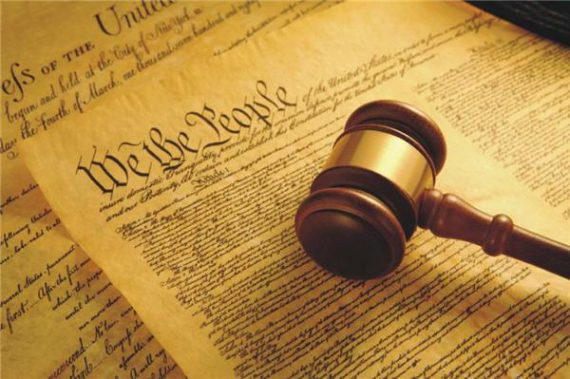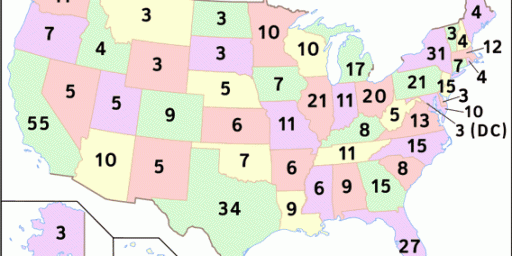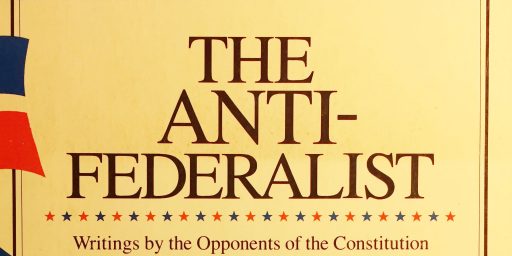Does the Constitution Matter?
It's a wonder the Constitution gets followed at all.
In a column titled “All the President’s Privileges,” Ross Douthat catalogs the degree to which both Barack Obama and the Democratic establishment seem to have enthusiastically embraced the consolidation of power in the executive branch that they vigorously decried when George W. Bush and the Republicans were in control. None of this is unfamiliar and hypocrisy of that sort is so engrained in our system that it’s almost unsporting to point it out at this point.
Douthat draws an interesting lesson, though:
But these turns are not always a bad thing. Sometimes it was the original partisan critique that was overdrawn, and sometimes power educates rather than corrupts. If the view from the State Department looks different from the view from Yale Law School, it isn’t necessarily the State Department that’s wrong.
What’s more perilous is the extent to which these sudden shifts reflect something unique to constitutional debates — namely that arguments for constitutional limits tend not to sway people who don’t already have a political incentive to support them.
Partisan about-faces are inevitable, but they’re arguably easier on constitutional matters. Change your mind on immigration, and your constituents may well revolt. Change your mind on whether a president has the power to do things on immigration policy that your constituents already support, though, and only your partisan critics and the occasional law professor will care.
This is why it’s so remarkable that our constitutional order has lasted so long, given the perpetual incentive — common to both parties, and all three branches of government — to abandon its safeguards in order to push a particular agenda.
This is exactly right. Those of us who actually do care very much about process even when our guy is in office or when we’re getting our way on policy are rare birds, indeed. We’re more likely to write blogs and op-eds about it but, at the end of the day, we really don’t much matter. So, while I think Obama’s decision to selectively enforce our immigration laws as an end around against Congressional intransigence is a dangerous overreach–despite preferring his selective approach to the outcome of vigorously enforcing the laws on the books–Obama’s calculus is based almost entirely on whether it helps or hurts him at the polls in November.
Douthat’s close, though, doesn’t make much sense:
Today those incentives are strongest for Democrats — visible in their support for Obama’s more dubiously constitutional forays, and also in the widespread liberal attempt to explain his struggles by casting him as a Gulliver tied down by an antiquated system of government.
Conservative pundits have noted that similar explanations were proferred to explain the failures of Jimmy Carter. That in and of itself isn’t proof that they’re wrong. But it suggests the possibility that some of the ways this president has been baffled, legislatively and perhaps soon in the courts, reflect the genius of our constitutional system rather than its failings. It’s a system that often lacks principled defenders, but that’s designed to defend itself.
It’s rather odd to argue that the current operation of our government has much at all to do with the design of the Framers. The presidency is radically more powerful than it was intended to be, both because it commands a vast national security state that most of the Founders would have found abhorrent and because it oversees a bureaucratic leviathan that the Framers couldn’t have imagined and certainly never provided for. The Senate operates nothing at all like the Framers envisioned, having all manner of extraconstitutional hurdles like anonymous holds and requiring supermajorities for just about any legislation. And the Supreme Court is not only more powerful than most of the Framers anticipated but operates as a partisan political venue.
Nor is it obvious how the president being able to ignore laws passed through our already labyrinthine process–which, after all, already provides for a presidential veto–reflects “the genius of our constitutional system rather than its failings.”
The only real saving grace is that even the most imperial presidents–Woodrow Wilson, Franklin Roosevelt, Richard Nixon, and George W. Bush–have heretofore backed down when the Supreme Court rules that they’ve exceeded their authority. But, with public respect for the Supreme Court at an all time low, it’s not at all inconceivable that presidents might one day treat Court opinions with all the respect they now accord the law of the land.







I don’t believe Douthat is arguing the “current operation” of the federal government is somehow tied to the framers. I believe he’s arguing the structure of the government itself still provides various degrees of checks and balances despite the way in which the government currently is operated. Reading further between the lines Douthat appears to be anticipating that Team Obama will be smacked down by the SCOTUS on one or both of the two watershed rulings this week.
Incidentally, the SCOTUS for over 200 years has operated as a “partisan political venue.” Marbury v. Madison was a partisan political spat if there ever was one, and I don’t think we have to go out on a limb to presume that many members of Congress were gobsmacked by that decision. Dred Scott. Plessy. The Slaughterhouse cases. The Lottery cases. Lochner. The New Deal cases. The “switch in time.” Gideon. The internment camp cases. The Steel Seizure case. Brown v. Board. Baker vs. Carr. Miranda. The Nixon tapes. Hell, the list of cases in which the SCOTUS played politics, directly or de facto, reads like a scroll. That’s not necessarily a bad thing. Perhaps it’s not exactly what the Framers intended, but sometimes unintended consequences work out better than those that were intended.
@Tsar Nicholas: While it’s certainly true that Supreme Court justices have always had ideological axes to grind and were appointed by presidents with a partisan agenda, the current climate is different.
Marbury, Brown, and Nixon were all unanimous decisions. Dred Scott was 6+1 with 2 dissenters, and not a party line vote. Indeed, most of the cases you cite are over non-partisan issues.
@Tsar Nicholas:
Which means what, according to Douthat?
“The only real saving grace is that even the most imperial presidents–Woodrow Wilson, Franklin Roosevelt, Richard Nixon, and George W. Bush–have heretofore backed down when the Supreme Court rules that they’ve exceeded their authority.”
That’s only a saving grace to the extent the Court acts as a political but non-partisan body. If the Court is now going to be near totally aligned with and representing the interests of a certain segment of the populace, bending your knee to that kind of authority is actually harmful to the health of law and democracy.
Mike
Someone (here, Steven?) quoted the founders on setting men’s ambition at odds. Where is Congress? Where is the ambition of Congress to draft law and direct the country?
I just heard some knucklehead on TV (Coumo?) complaining that Congress can’t pass a spending reform bill until the President introduces one.
That’s the opposite of what you want, right James?
Not to mention that it is a basic misunderstanding of the separation of powers. The word “legislative” actually has a meaning. Congressmen have gotten into a whine cycle where they want the President to do their jobs, so that they can then complain that he didn’t do it better.
@john personna: The system has been turned on its head since FDR’s day, with some occasional resurgences in Congress taking itself seriously. The Framers expected the institutions to guard their power jealously. Instead, loyalty to party has trumped loyalty to our institutions, including the Constitution itself.
@James Joyner:
Congressmen have discovered a shortcut to reelection. They need only maintain party rhetoric. They don’t need to solve problems.
When you say “loyalty” that implies some self-sacrifice, something we don’t commonly see in Congresscritters. How many have fallen on their sword for their party?
@john personna: A fair point. Gerrymandering has made most House districts party affairs. And the current hyperpartisan era means that even Senators now face the very real risk of well-financed primaries if they stray too far from the party line. So, it’s not “loyalty” per se but a sense of self-interest in a Godfather world.
(And this problem-solving-avoidance does seem to be at a new high, as recognized by Congressional approval at new lows. For that reason I’d reject it as “same old, same old” or “since FDR.”)
@James Joyner:
Yes, I was also thinking ‘mobsters.’
@john personna: IMO it’s about reelection and to do that Congresspeople must spend their time campaigning, raising money, and bringing home the federal dollar bacon to their districts. There’s not time for much else, like legislating.
The only thing I would beg to differ on is “the only reason is to get re-elected”.
Have to remember the Executive has to issue coherent instructions to his “troops”. With the new, post 9/11 SS# security, very large numbers of these technically “illegal” aliens (the ones brought here as young children and are now in their 20’s and 30’s with no memory of living anywhere else) are being exposed as never before.
I think we need to remember these Presidents actually have to manage things. Buck stops, and all that. They can’t just throw up their hands and walk away as Congessmen can.
@Dazedandconfused:
Well, the Constitution says the Executive executes laws legislated by the Legislature.
I’m saying this demand that the Executive legislate is supposed to be a specialhigh case, creme on top, not filling. It is a punt to demand it for any action.